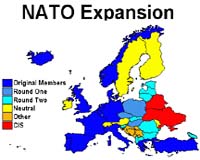 |
Tokyo (AFP) Dec 17, 2010 Japan on Friday labelled the military build-up of rival China a global "concern" and said it would strengthen missile defences against the threat from North Korea, as part of a major strategic review. The changes would also see Tokyo boost its southern forces and submarine fleet and upgrade its fighter jets as part of a shift in its defence focus from the Soviet Cold War threat to southern islands nearer China. The cabinet of officially pacifist Japan approved the National Defence Programme Guidelines months after a territorial row flared up with China and weeks after North Korea launched a deadly artillery strike against South Korea. Beijing called Japan's stance "irresponsible". "No country has the right to appoint themselves the representative of the international community and make irresponsible comments on China's development," Chinese foreign ministry spokeswoman Jiang Yu said in a statement. The new guidelines labelled North Korea -- which in recent years has fired missiles over Japan, staged two nuclear tests and last month unveiled a new uranium enrichment plant -- an "urgent, grave factor for instability". Japan, like its top security ally the United States, again voiced concern over China's recent military build-up and increased assertiveness in what Beijing sees as its ancestral waters in the East China and South China seas. "China is rapidly modernising its military force and expanding activities in its neighbouring waters," said the guidelines. "Together with the lack of transparency on China's military and security issues, the trend is a concern for the region and the international community," said the paper, which sets out strategic planning for the coming decade. Security analyst Akira Kato, a professor at Tokyo's Oberlin University, said "the guidelines underline Japan's clear shift of focus to counteracting China's growing naval power, which is a major threat to Japan and the United States." Japan will increase its submarine fleet from 16 to 22 and modernise its fighter jets, but scrap more than 200 tanks and 200 artillery pieces, it said. It also plans to double from three to six its land-based Patriot Advanced Capability-3 interceptor missile systems, and increase from four to six the number of sea-based Standard Missile-3 interceptors on its Aegis destroyers. Pledging a more nimble defence capability, it said: "We will build a dynamic defence force backed by sophisticated technologies and intelligence, with readiness, mobility, flexibility, sustainability and multiple disciplines." The outlook moves away from the perceived Cold War threat of a Soviet invasion and calls for drawing down troop strength on northern Hokkaido island. Instead it says Japan will boost its ground, air and naval forces on the far-southern Nansei islands that take in Okinawa, a major base for US forces, and are closer to remote flashpoint islands near Taiwan. The guidelines called the Japan-US alliance "indispensable". They also say Japan will enhance security ties with South Korea, Australia, Southeast Asia and India and "promote confidence and cooperation with China and Russia" while also enhancing ties with the European Union and NATO. The defence guidelines are usually revised every five years but came a year late following Japan's 2009 power shift in which the centre-left Democratic Party ended a half-century of almost unbroken conservative rule. Japan's new leaders initially quarrelled with the United States about the 50,000-strong US troop presence in the country -- but that row subsided as tensions grew sharply this year between Tokyo and Beijing. The Asian giants argued early in the year over what Japan regarded as provocative Chinese naval manoeuvres off its far-southern islands. Then in September, the war of words escalated when Japan's coastguard arrested a Chinese trawler captain after two collisions in disputed waters, a row that for months plunged diplomatic ties to their lowest point in years. "Regarding China ... annually its defence budget has increased in a non-transparent manner and we have experienced multiple situations in one year over which we had to lodge protests," said top government spokesman Yoshito Sengoku. "These are matters of concerns to us." Regional tensions spiked again after North Korea's November 23 shelling that killed four South Koreans. China has since then resisted calls by the United States, South Korea and Japan to publicly condemn its ally North Korea. burs-pst/ft
Share This Article With Planet Earth
Related Links Learn about the Superpowers of the 21st Century at SpaceWar.com Learn about nuclear weapons doctrine and defense at SpaceWar.com
 Uncertain World: Arguments Against Russia Joining NATO
Uncertain World: Arguments Against Russia Joining NATOMoscow, Russia (RIA Novosti) Dec 17, 2010 This past year saw a lot of speculation about whether Russia will ultimately join NATO. Prominent analysts and former politicians took to the pages of Western publications to voice their opinion on the desirability of Russian membership. The NATO Strategic Concept Expert Group, chaired by former U.S. Secretary of State Madeleine Albright, held a lively discussion on the issue, but the conc ... read more |
|
| The content herein, unless otherwise known to be public domain, are Copyright 1995-2010 - SpaceDaily. AFP and UPI Wire Stories are copyright Agence France-Presse and United Press International. ESA Portal Reports are copyright European Space Agency. All NASA sourced material is public domain. Additional copyrights may apply in whole or part to other bona fide parties. Advertising does not imply endorsement,agreement or approval of any opinions, statements or information provided by SpaceDaily on any Web page published or hosted by SpaceDaily. Privacy Statement |